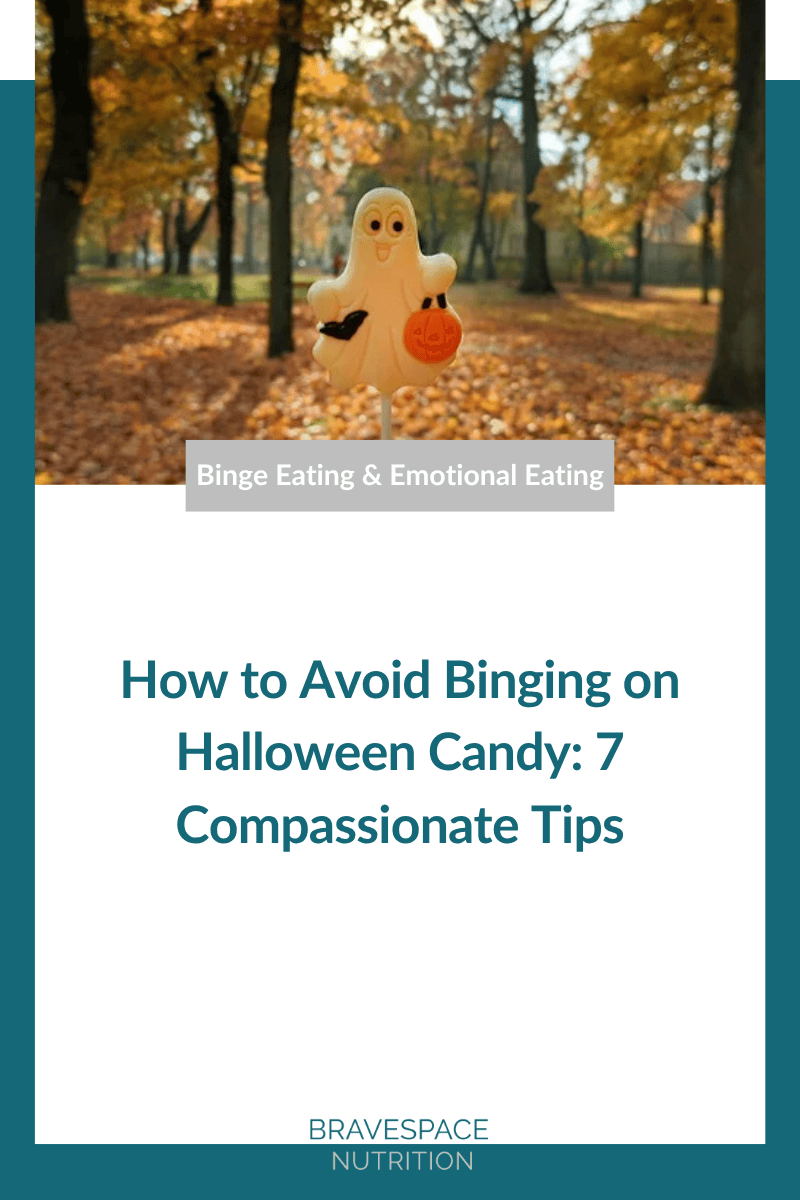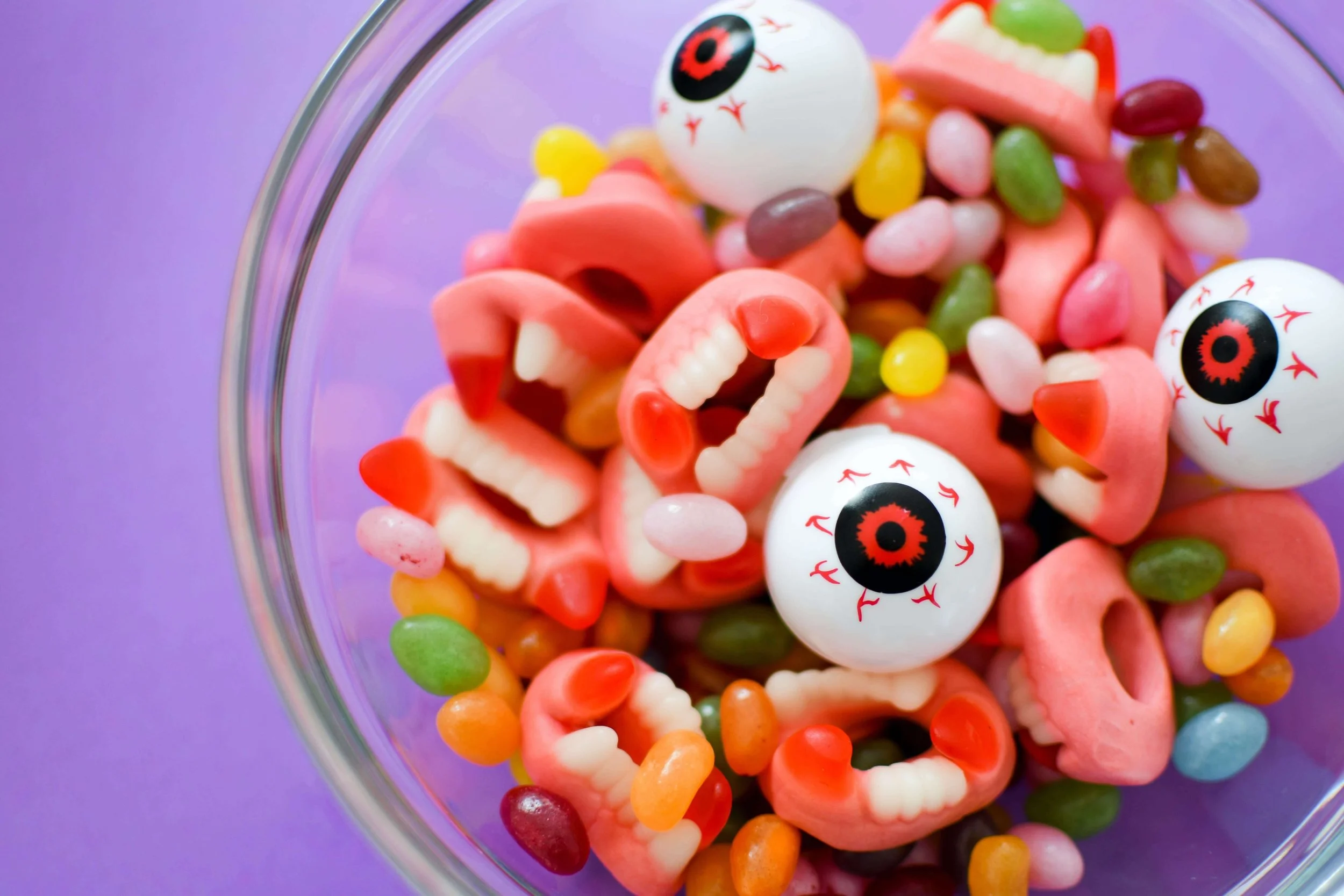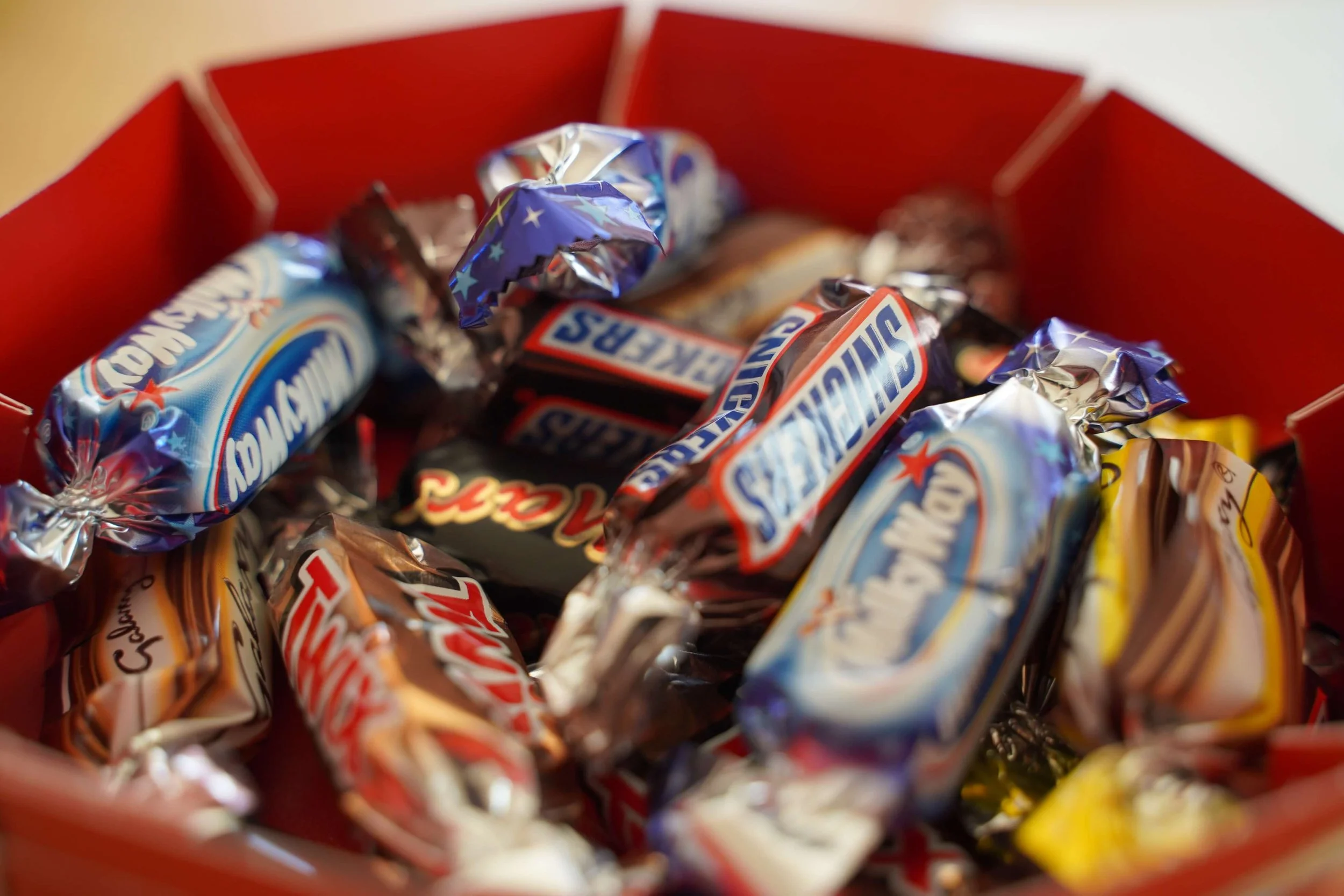How to Avoid Binging on Halloween Candy: 7 Compassionate Tips
With the changing weather and looming holiday season, it’s natural to feel fearful when it comes to the abundance of candy that will soon surround you. If you’re worried that you’re going to feel the urge to binge on candy this Halloween, you’re not alone.
It’s difficult for many to avoid candy throughout the holiday season. There seems to be candy, sweets, and desserts everywhere! Struggling with binge eating and binge urges is a struggle for many people during this time of year and having fear around candy is natural for people who struggle in their relationship with food. And, it doesn’t have to be this way! There are ways you can reduce your cravings and urge to binge on Halloween candy this year!
Why Halloween Candy Can Feel Overwhelming
Halloween candy isn’t just about sugar (or your fear of sugar), it’s also about emotions, memories, and social pressures. Candy often combines flavors and textures that are very appealing, which can make cravings feel intense.
Advertising, social messaging, what candy was like for you growing up, and limited-time offers make candy feel “special” or scarce. When combined with messages that candy is “bad” or “forbidden,” it can create a sense of urgency or anxiety around eating.
If you feel uneasy about Halloween candy, it’s not a reflection of your character or self-control, it’s a normal reaction shaped by experience and biology. You are not broken or weak for feeling this way. Recognizing these influences is an important step toward having a calmer, more peaceful relationship with candy.
7 Tips to Help You Avoid Binging on Candy This Halloween!
Tip #1 - Understand why you’re experiencing the urge to binge
Before trying to avoid binging altogether, it’s important to understand why you feel the urge to binge on candy. You can start this process by asking yourself these questions:
“Do I deny myself candy throughout the rest of the year?”
Denying yourself the experience of candy throughout the rest of the year can lead to a strong urge to binge candy on Halloween and after. If you find yourself restricting candy or sweets, it’s natural to feel an intense urge to binge. Your body and brain don’t know if you’ll have access to candy again, and because of this, you mayfeel like you have to eat as much as you can right now.
“Do I feel shame or guilt after eating candy?”
If you have a negative relationship with sweets, it’s natural to feel guilty, ashamed, or embarrassed after eating candy. You feel as if you’re being “bad” or that you’ve already “messed up”, so you end up binging. “Might as well keep going and tomorrow I’ll do better,” you say to yourself. Feelings of shame and negative self-talk push you into a spiral that can intensify your urges to binge. If you tell yourself that you’ve ruined your day because you’ve had “too much” candy, it’s time to re-evaluate your relationship with candy.
“When I binge or feel the urge to binge, do any negative feelings arise?”
Food and body experiences from your childhood can drive your urge to binge. If you’ve had a negative food or candy experiences in your childhood, or adults in your childhood made negative comments about your appearance, these experiences have shaped your relationship and mindset towards food and your body. It’s expected that these feelings will show up in your relationship with food as an adult. Diving deep into these feelings can be challenging, but it’s a crucial step in healing your relationship with candy and ending the binging cycle.
Understanding the answers to these questions is important to understand why the binging is occurring. Once you know your why, you can move forward in healing your relationship with candy!
Tip #2 - Have your candy out in the open and allow yourself consistent access to it!
When you restrict candy or don’t allow yourself access to candy, you unintentionally create the experience of the “last supper mentality”. This is when you feel like you’re never going to be able to have candy again, and this creates an intense urge to binge on the candy when you do have access to it. At first, cravings may feel strong. This is completely normal. Feeling a craving does not mean you are out of control. With consistent access, candy becomes a neutral, enjoyable part of life.
The best thing you can do in this situation is allow yourself to have candy and make sure you have consistent access to it. The more you avoid candy, the stronger this “last supper mentality” will be. Your urges to binge will only intensify.
Try having a bag of candy in the pantry , or even put it in a bowl in the kitchen or living room. This can often feel really scary at first. Practice giving yourself unconditional permission to eat the candy and have it in your home. This may seem counterintuitive, but it’s important for your body to know that you aren’t in a “last supper mentality” and know that candy is abundant. When you give yourself permission to eat the candy, you may experience intense cravings at first, but these feelings will eventually subside. Once your body knows it has consistent access to it, things will feel more in control.
Tip #3 - Avoid negative self-talk when you do have candy or sweets.
Often times, binge eating leads to a lot of negative feelings of shame, embarrassment, or guilt. It’s common for people to go into a negative self-talk shame spiral after having a piece of candy or many pieces.
For example, you might have a few pieces of candy, and begin to think thoughts like…
“I shouldn’t have eaten that.”
“I’m embarrassed and ashamed that I caved into my cravings.”
“I’ve ruined the day, I might as well eat the rest.”
Negative self-talk after eating sweets leads to a “F-it” mentality, where you say, “F-it, I might as well eat the rest of it.”
Working towards a more-positive mindset and restructuring your thoughts around candy can help reduce your urges to binge eat. Instead of thinking negative thoughts like the ones above, try to practice these instead…
“I really enjoyed that piece of candy, and now I’m satisfied.”
“Just because I had a piece of candy doesn’t mean I did something wrong or messed up.”
“I deserve to have unconditional permission to eat what I want.”
“I ate too much candy and now I don’t feel good. I am still learning and this doesn’t mean that I failed.”
Practicing these mantras can transform your mindset around candy and sweets, and help you build a more positive, non-fear-based relationship with candy
Lastly, if you do have candy, it’s likely that you’ll have the urge to diet or restrict food in an effort to “get back on track”. Doing this reinforces the idea that you don’t have consistent access to the candy, and it heightens your cravings for the candy. It’s an endless cycle that leaves you feeling unsatisfied and unfulfilled.
Tip #4: Mindful Eating and Awareness
Mindful eating is about slowing down, paying attention, and tuning in to your body and senses. It can help you enjoy sweets without fear or guilt, and reduce urges to eat large amounts automatically.
Enjoy each bite: Notice the flavors, textures, and aroma of your sweets. Really pay attention to what you’re tasting rather than eating on autopilot.
Pause between bites: Give yourself a moment to check in: do you still feel like eating more, or are you satisfied? Pausing helps your brain register enjoyment and fullness.
Serve with intention : Instead of eating straight from the bag (this is ok too btw!), scoop some candy into a bowl or container. Create a space to enjoy the candy intentionally instead of checking out while you eat. This is not to restrict the amount you eat but rather to be present with your experience.
Notice your body and emotions: Check in with how eating sweets feels. Are you eating because of boredom, stress, or true enjoyment? Simply observing your cravings with curiosity can reduce their power.
Mindful eating can teach your brain that sweets are enjoyable and safe, reducing anxiety and fear over time. Cravings are natural, and noticing them without judgment is a skill you can practice.
Tip #5: Keep Enjoying Balanced Meals
Eating regular, satisfying meals can make sweets feel less urgent and prevent feeling out of control. This is because your body is very smart and if you’re not getting enough food, and especially enough carbohydrates, you are going to crave candy more intensely. The goal is nourishment, not restriction or “control”.
Enjoy foods that leave you feeling satisfied: Include meals that are satisfying, flavorful, and energizing.
Check in with hunger and fullness cues: Be curious about when your body signals it wants food, and pause when it feels content. This may not be clear if you’re just starting this work and that’s ok.
Normalize sweets as part of your day: When meals are satisfying, sweets become joyful!
The key here is learning to trust your body which can take time if you’ve been dieting and feeling out of control with food for some time. You likely blame yourself for “not having enough discipline”. You don’t need to plan or “save room” for sweets. By listening to your body and providing what it needs, sweets become just one enjoyable part of the day.
Tip #6: Validate Your Feelings and Seek Support
Feelings of fear, anxiety, or a sense of losing control around sweets are completely normal, especially if you’ve had past experiences with restriction, dieting, disordered eating or food rules. You are not alone, and these feelings do not define you.
Talk to someone who gets it: Sharing your experiences with a friend, community, or support group can normalize what you’re feeling.
Write down your triggers and emotions: Journaling can help you understand patterns, release shame, and notice moments when you feel empowered.
Seek professional support if needed: A dietitian who understands binge eating and body-positive approaches can offer guidance without judgment.
Acknowledge progress: Noticing cravings and responding with awareness is a win. You are building skills to manage sweets in a way that feels calm and safe.
Validation is powerful. By recognizing your feelings without judgment, you can reduce shame and break cycles of fear and bingeing.
Tip #7: Enjoy Halloween Without Judgment
Halloween is about fun, community, and celebration. Sweets are just one part of the experience that makes Halloween so exciting and joyful.
Notice and enjoy: When you eat sweets, pay attention to the experience and what you like about them.
Engage in the holiday: Participate in decorating, costumes, social events, or creative activities for the joy of it, not to offset or avoid sweets.
Be kind to yourself: Any feelings that come up around sweets are valid. Don’t have to judge yourself or your eating.
Shift the narrative: Instead of worrying about control, try saying to yourself: “Sweets are enjoyable. I can have them and still feel safe and calm.”
The goal is to reclaim Halloween as joyful and safe, where sweets are part of the fun rather than a source of fear.
This Halloween, you’re allowed to eat candy without restricting foods or dieting afterwards. You don’t need to compensate through exercise or restrict to “undo” it. You deserve to eat candy without needing to feel punished through diet or exercise. While it may seem challenging, try to avoid dieting, restricting, or excessive exercise after eating candy this year. This will help normalize the experience of eating candy and reduce urges to binge in the future.
You’ll also love…
Krispy Kreme Doughnuts & 3 Myths About Sugar That You Need To Know
Dear Diet Culture Letter: How Dieting Steals Joyful Food Memories
Turkey With A Side Of Diet Culture
Do you want to stop binge eating Halloween candy or sweets in general?
Halloween doesn’t have to be a time of anxiety or fear. If you’re struggling with food anxiety this time of year, you’re not alone. I know how challenging the holidays can be when it comes to food, especially if you struggle with binge eating or the urge to binge. As a Dietitian and Nutrition Therapist, I know how tricky holidays can be and I want to be sure you’re are equipped with the tools to help you heal your relationship with food especially during the holidays. To get started, schedule a free 15-minute discovery phone call today!



